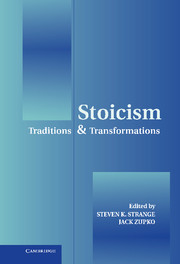Book contents
- Frontmatter
- Contents
- List of Contributors
- Acknowledgments
- List of Abbreviations
- Stoicism
- Introduction
- 1 The Socratic Imprint on Epictetus' Philosophy
- 2 The Stoics on the Voluntariness of the Passions
- 3 Stoicism in the Apostle Paul: A Philosophical Reading
- 4 Moral Judgment in Seneca
- 5 Stoic First Movements in Christianity
- 6 Where Were the Stoics in the Late Middle Ages?
- 7 Abelard's Stoicism and Its Consequences
- 8 Constancy and Coherence
- 9 On the Happy Life: Descartes vis-à-vis Seneca
- 10 Psychotherapy and Moral Perfection: Spinoza and the Stoics on the Prospect of Happiness
- 11 Duties of Justice, Duties of Material Aid: Cicero's Problematic Legacy
- 12 Stoic Emotion
- Works Cited
- Name Index
- Subject Index
7 - Abelard's Stoicism and Its Consequences
Published online by Cambridge University Press: 11 July 2009
- Frontmatter
- Contents
- List of Contributors
- Acknowledgments
- List of Abbreviations
- Stoicism
- Introduction
- 1 The Socratic Imprint on Epictetus' Philosophy
- 2 The Stoics on the Voluntariness of the Passions
- 3 Stoicism in the Apostle Paul: A Philosophical Reading
- 4 Moral Judgment in Seneca
- 5 Stoic First Movements in Christianity
- 6 Where Were the Stoics in the Late Middle Ages?
- 7 Abelard's Stoicism and Its Consequences
- 8 Constancy and Coherence
- 9 On the Happy Life: Descartes vis-à-vis Seneca
- 10 Psychotherapy and Moral Perfection: Spinoza and the Stoics on the Prospect of Happiness
- 11 Duties of Justice, Duties of Material Aid: Cicero's Problematic Legacy
- 12 Stoic Emotion
- Works Cited
- Name Index
- Subject Index
Summary
As Sten Ebbesen has emphasized in his contribution to this volume, the influence of Stoicism in the Middle Ages is to be found everywhere and is yet felt subtly enough that one is often unsure whether it is Stoicism itself that is being encountered. Part of the reason for this is fairly simple: Stoicism was so very influential in the Roman Empire that it left its mark on most of the church fathers and on most of the philosophical schools of late antiquity. Because so little work by card-carrying Stoics has survived, Stoic ideas were transmitted into the Middle Ages largely through thinkers who, while influenced by Stoicism, were not themselves Stoics and who often made free with Stoic ideas. Not surprisingly, it is often hard to tell when a later thinker is in some important way a Stoic.
In this chapter I want to make one piece of what would have to be a much more complex argument to be complete. My larger thesis is that Peter Abelard is as close to Stoicism as a Christian could be and that in his case this is not some independent rediscovery of Stoic ideas but a self-conscious taking up of them with profound consequences for later medieval philosophy. I stake this claim as a claim about Abelard's positions in a variety of areas, including logic – hence my ambiguous title.
- Type
- Chapter
- Information
- StoicismTraditions and Transformations, pp. 132 - 147Publisher: Cambridge University PressPrint publication year: 2004
- 3
- Cited by



